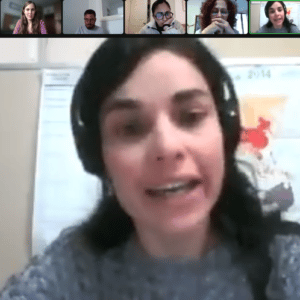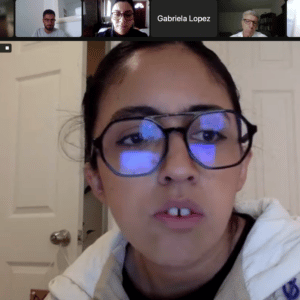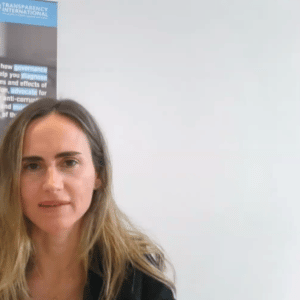18 July 2022 –
While corruption impacts all persons living in a society, more than 20 years of academic research and anti-corruption advocacy have shown that some members of society suffer its impact more than others. Corruption weakens the capacity of the most vulnerable to hold their governments accountable, foments impunity when they are victims of corruption, and impedes witnesses and whistleblowers of corruption from coming forward.
Gender is a dimension that has recently gained significance when evaluating the impact of corruption. Civil society activists and practitioners have increasingly sounded the alarm in regards to how corruption affects women and members of the LGBTQI+ community disproportionally. Latin America and the Caribbean, a region where traditional governmental structures have perpetuated spotty protections for human rights while, in parallel, experiencing a boom in women’s rights and LGBTQI+ activism, is increasingly evaluating how corruption affects people differently, according to gender. Hence, the link between gender and corruption, its challenges and ways to make it visible were discussed at our 7th Regional Meeting for Latin America and the Caribbean with almost 40 participants of the UNCAC Coalition network.
Gender and the UNCAC
The UNCAC is mute on the issue of gender. The word “gender” is absent from the text of the convention and no amendments have been made to the text in this regard. The Conference of the States Parties (CoSP), through three resolutions (see here, here and here), has made specific references to “gender”, “women” or incorporating “a gender perspective” and recent CoSPs have featured side events on the nexus between gender and corruption.
Furthermore, the Political Declaration of the 2021 UN General Assembly Special Session on Corruption (UNGASS) includes a commitment of States Parties to the UNCAC to improve their, “understanding of the links between gender and corruption, including the ways in which corruption may affect women and men differently… promote gender equality and women’s empowerment, including through mainstreaming in relevant legislation, policy development, research, projects, and programs, as appropriate and in accordance with fundamental principles of domestic law.”
To push States Parties to further integrate gender into the international anti-corruption agenda, UNCAC Coalition member organizations have submitted recommendations to the UNGASS and UNCAC CoSP subsidiary bodies, for instance, to recognize sextortion as a form of bribery, produce gender-disaggregated data on corruption offenses and create safe and gender-sensitive reporting mechanisms and protections for women and other vulnerable persons, ensuring confidentiality, privacy, and psychological support.
Members and affiliates of the UNCAC Coalition from Latin America and the Caribbean recently presented a written submission to the Independent Review Group (IRG) of the UNCAC regarding the differentiated impact of corruption on underrepresented and vulnerable groups. This submission focused, in part, on the impact of corruption on women and the LGBTQI+ community, and called upon states to seriously examine how corruption corrodes these groups’ human rights and access to justice.
Gender and corruption in the Latin America and Caribbean region
At the Inter-American level, small advances have been made to integrate a gendered perspective into anti-corruption policies and laws. Most notably, the report of the Inter-American Commission on Human Rights entitled “Corruption and Human Rights” dedicates an entire chapter on the differential impacts of corruption on vulnerable groups, including women and LGBTIQ persons. Similarly, the Inter-American Court of Human Rights has issued several judgments where it draws a direct line between corruption and the violation of women’s human rights. The most notorious of these judgments was the González y Otras (“Campo Algodonero”) v. Mexico case.
Despite this, in practice, efforts by States Parties in the region to include gender as a dimension of the anti-corruption agenda have been lagging. The Citizen Corruption Observatory of the Americas in its final report “Regional Assessment – Follow-up to the Lima Commitments”, recorded that among the anti-corruption commitments that countries pledged to implement in 2018, Commitment No. 8: “Include diverse groups in situations of vulnerability in the definition of measures to strengthen governance and combat corruption, recognizing its serious impact on these populations”; obtained the lowest score in this follow-up for the entire region. In other words, no governmental mechanisms and actions have been developed to promote the inclusion of vulnerable groups in the elaboration of anti-corruption measures.
The consequences are apparent: in a recent study by Transparency International, in Latin America and the Caribbean, one in five people report being victims of extortion based on sexual violence.
Paraguay: a case study of barriers to incorporating gender into anti-corruption policies
 María Jose Durán and Marta Ferrara from Semillas para la Democracia presented Paraguay as a case study of the many barriers that can exist to incorporating a gendered perspective into the national anti-corruption agenda and to the work of women’s and LGBTQI+ activism. The country officially declares itself to be against “gender ideology”, with an increase in violent crimes and offenses against women and LGBTIQ communities and electoral backlash against candidates calling for gender perspectives in public policy. In practice, this violence has been directed against activists and organizations denouncing human rights violations and corruption, creating difficult situations for advocacy.
María Jose Durán and Marta Ferrara from Semillas para la Democracia presented Paraguay as a case study of the many barriers that can exist to incorporating a gendered perspective into the national anti-corruption agenda and to the work of women’s and LGBTQI+ activism. The country officially declares itself to be against “gender ideology”, with an increase in violent crimes and offenses against women and LGBTIQ communities and electoral backlash against candidates calling for gender perspectives in public policy. In practice, this violence has been directed against activists and organizations denouncing human rights violations and corruption, creating difficult situations for advocacy.
Public policies on access to information and communication technologies do not contemplate the gender dimension beyond institutions that can collect data on violence against women. Statistics and analysis on the impact of public policies on vulnerable groups are increasingly non-existent.
Ahead of the Regional Meeting, the duo from Semillas para la Democracia made an access to information request to the Secretaría Nacional Anticorrupción (National Anti-Corruption Secretariat, SENAC) to ask how they incorporate gender into their anti-corruption policies. They were surprised that the Secretariat had made some lukewarm progress since the SENAC had never publicized any initiatives related to gender and corruption: it has included a human rights perspective, including women’s rights, into their National Integrity Plan, has committed itself to a gender equal distribution of senior management positions in offices of access to information and transparency in all state agencies and entities, and has begun to develop potential legal tools on which to base future advocacy actions, opening up this process for future public consultation.
The situation in Paraguay is not unique to the region: many of the participants in the Regional Meeting echoed that many of the same barriers to an anticorruption agenda with a gender perspective persist in their countries.
Mexico: how can a feminist perspective fit into anti-corruption activism

The next presenter, María Fernando Galicia Pacheco from Mexiro, provided insights into how her organization has integrated feminist concepts into its anti-corruption work and reflected on how these perspectives can impact anti-corruption advocacy. Mexiro channels its work based on the following three feminist theoretical frameworks:
- Decolonial feminism, which aims to critique Eurocentrist constructions around gender and the Latin American experience. This leads Mexiro to incorporate ideas from women from diverse backgrounds and settings, and also incentivises them to avoid common stereotypes of women when formulating policy.
- Community-centred feminism, which argues that women’s struggle to take back land in the public sphere must essentially be accompanied by taking back their “body-territory”, in regards to actions taken to limit women’s decisions over their bodies. This in turn allows them to understand corruption’s effects on both women’s space in the state and in society, as well as its effect on women’s bodies.
- Antimilitarist feminism, which aims to distance itself from discourses of empowerment and activism from war and armed conflict, both of which hold women as primary victims. Mexiro talks about the construction of anti-corruption and integrity policies as a struggle for human rights, rather than a “fight” or “war” against corrupt actors.
María Fernanda related these concepts with some of Mexiro’s initiatives. For example, they accompany victims of torture by state authorities, essentially putting into practice the “taking back” of women’s bodies from corrupt state actors. Another example is Mexiro’s Latin American Feminist Anti-Corruption Advocacy School, which aims to empower women from Latin America with knowledge about how to report and denounce corruption, how to organize against it, and what legal recourses are available for victims.
Sextortion: How can we measure corruption when it commodifies women’s bodies
 Luciana Torchiaro, Regional Advisor for Latin America and the Caribbean at Transparency International (TI), recorded a brief video about TI’s actions striving to quantify and qualify the impact of corruption as it relates to gender. She explained some of the barriers to measuring corruption when sex is the token of exchange in a corrupt act: social pressures placed upon women and LGBTQI+ people to remain silent in regards to abuse, the prevalence of male-dominated authorities that may be complicit in said crimes, the lack of relevant statistics based on court cases, and the negative effects of coming forward, especially in those places where they would be considered accomplices of the corrupt act.
Luciana Torchiaro, Regional Advisor for Latin America and the Caribbean at Transparency International (TI), recorded a brief video about TI’s actions striving to quantify and qualify the impact of corruption as it relates to gender. She explained some of the barriers to measuring corruption when sex is the token of exchange in a corrupt act: social pressures placed upon women and LGBTQI+ people to remain silent in regards to abuse, the prevalence of male-dominated authorities that may be complicit in said crimes, the lack of relevant statistics based on court cases, and the negative effects of coming forward, especially in those places where they would be considered accomplices of the corrupt act.
Luciana recounted TI’s path to trying to quantify the impact of corruption based on gender. First, TI aimed to incorporate indicators with a gender perspective in their latest Global Corruption Barometer. While the information they gained gave a valuable glimpse into sex as a token of corruption, TI’s team suspected that the conditions mentioned above may have led to underreporting. TI’s approach, then, was to develop and create awareness about the term “sextortion”, which occurs when those entrusted with power use it to sexually exploit those dependent on that power. They worked with many of their national chapters to flesh out the concept, developing several region-specific methodologies to better understand how corruption impacts gender in different ways.
Discussion on issues related to gender and corruption in the region
A lively discussion followed the presentations. Several organizations spoke about the ways they have tried to understand the links and effects of corruption and gender. Representatives from Equipo Latinoamericano de Justicia y Género and Poder Ciudadano shared information on their joint project entitled Gender and Corruption in Latin America, on the intersections of gender and corruption. This project developed a methodology to register the impact of corruption on women’s lives, anti-corruption programmes, and public policies with a gender perspective, and knowledge of access to information and justice for women in vulnerable situations, on both the national and regional level. These organizations then worked with others from Ecuador, Peru, and Guatemala, among others, to produce national profiles concerning gender and corruption.
A representative from Proética in Peru explained how local contexts might hinder a new bill that would criminalize sextortion, since suggested modifications presented by the Human Rights and Justice Commission of the Peruvian Congress would turn victims of sextortion into potential accomplices of corruption. Like in Paraguay, Peru is scaling down policies and programmes with a gender perspective, making Proética nervous about the bill’s potential for positive change.
Other participants spoke about potential strategies to raise awareness about the differentiated impact of corruption based on gender. A representative from Transparencia Mexicana noted that while there has been a very positive evolution in her country in regards to gender perspectives in state programmes and statistical collection, the problem of sextortion, notably among migrant women, has been around for decades and in many cases has become grotesquely “normalized”. She notes that future advocacy should not only centre on gender quotas or superficial gender-focused programmes but on elevating the experiences of women and members of the LGBTQI+ community to de strata of decision makers. A spokesperson for Asociación Civil por la Igualdad y la Justicia highlighted the importance of detailing and quantifying existing state-led efforts targeting women and LGBTQI+ persons, to avoid discourses that aim to cover up inaction. He celebrated Semillas para la Democracia’s initiative to demand information from the Anti-Corruption Secretariat in this regard, believing it to be a great way to begin the process of “mapping” policies from a gender perspective. A representative from Fundación Multitudes spoke about the need to also consider indigenous women’s experiences with corruption when speaking about the impact of corruption on women in the region. The socio-cultural norms and mechanisms of justice for women in indigenous communities should be considered by wider anti-corruption policy-makers in order for gender perspectives to be inclusive to all women.
Conclusions and way forward
As one of the participants noted: there is so much more left to be said about the impact of corruption and gender. All participants agreed that spaces like this Regional Meeting must exist to discuss strategic and collective actions that can be taken at the regional level to mitigate or eliminate the differentiated impact of corruption based on gender, and vowed to continue the discussion amongst themselves. Overall, the UNCAC and its States Parties must understand the challenge of working with women and LGBTIQ+ communities to develop anti-corruption policies that address those most affected by the scourge of corruption.
If you are a civil society activist from Latin America and the Caribbean and would like to become involved, please contact our Regional Coordinator Iñaki Albisu Ardigó at inaki.albisu@uncaccoalition.org.



